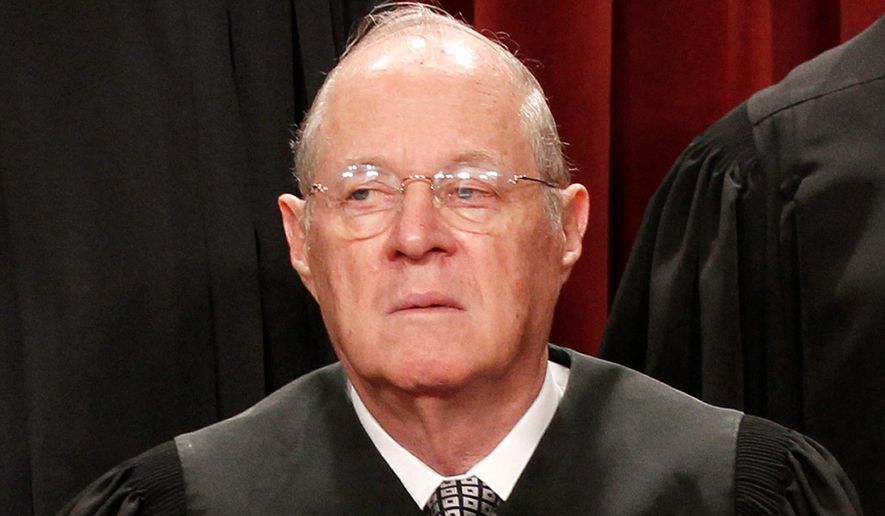OPINION:
The Supreme Court can sometimes twist itself into a pretzel to write law. The court on Monday upheld again the Constitutional principle that freedom of speech includes the right not to speak, but it all but apologized for saying so.
The court ruled on narrow grounds, but by an interesting margin, that a Colorado baker was within his rights to decline to bake a cake celebrating the legal union of two homosexual men.
Justice Anthony Kennedy three years ago wrote into the Constitution that the legal institution of marriage — established thousands of years ago across every culture and every religious faith — must include such homosexual unions. This time he wrote the opinion that the baker, Jack Phillips of Masterpiece Cakeshop, cannot be required to bake a cake to celebrate a union that his faith tells him is wrong. A “sin,” to use a quaint word.
“The neutral and respectful consideration to which [Mr.] Phillips was entitled was compromised here,” Justice Kennedy wrote. “The [Colorado] Civil Rights Commission’s treatment of his case has some elements of a clear and impermissible hostility toward the sincere religious beliefs that motivated his objection.” Indeed, one of the civil rights commissioners likened being deprived of a piece of wedding cake to slavery and the Holocaust. Justice Kennedy invited gay litigants to try again.
“The outcome of cases like this in other circumstances must await further elaboration in the courts,” he wrote, “all in the context of recognizing that these disputes must be resolved with tolerance, without undue disrespect to sincere religious beliefs,” A little disrespect might be all right, just nothing “undue.”
The tone of the opinion reeks of a valedictory. Mr. Kennedy wants everybody, particularly the Catholics (of whom he is one) and other conservatives to know that he’s not such a bad sort as all that. He can retire now with honor in the eyes of the lavender lobby and red-blooded conservatives as well. Or so he may imagine. He only angered nearly everyone, for either going too far or not far enough.
The opinion cut so close to the bone that nearly all justices could approve it, all except Sonia Sotomayor, who promised at her confirmation hearing to “rule as a wise Latina” and has faithfully kept her promise, and Ruth Bader Ginsburg, whose seat on the court tilts so far to the left that when the photographer shows up for the annual photograph of the High Court she occasionally falls out of the picture. Justice Clarence Thomas voted with the majority, but wanted an opinion covering more territory.
Nobody loses very much by the way the opinion was written. The case began when two gay blades, on their way to a hitching post in Massachusetts, went into the Masterpiece Cakeshop in Lakewood, California, to order a wedding cake for a wedding reception to follow in Colorado. Jack Phillips, whose religious convictions were well known in the community, told them, “I’m sorry, guys, I can’t do that.” He offered to bake them another kind of cake, just not a wedding cake.
“What followed,” says David Mullins, who was either the bride or the groom, “was this horrible pregnant pause while what was happening sunk in, and we were mortified.” Mr. Mullins and his very significant other, Charlie Craig, duly filed a complaint with the Colorado Civil Rights Commission. Soon it was pretty clear that what the bridal couple wanted was not a cake, but an issue to litigate. The commission decided that the bridal couple’s rights must be protected, and the baker has no rights to protect. If he felt “mortified,” tough. He should get a life, presumably with another guy in it.
Bashing bakers was catching. When Aaron and Melissa Klein, owners of a bakery in Portland, Oregon, devout Christians both, declined to bake a celebratory cake for a lesbian couple, the Oregon Bureau of Labor and Industries said they were in violation of a state law mandating LGBTQ sufferers certain rights in public accommodations. The Kleins were fined $135,000 and ordered to pay the couple “emotional distress” damages. The Kleins lost their business, but their “emotional distress” doesn’t count.
This is not the end of the affair. Other cases are percolating through the legal system, one or two of them up to the Supreme Court. These cases, too, are not about wedding cakes, or public accommodation, or even about being left out of wedded bliss. Gays want the larger culture to say that their “lifestyle” demands celebration by all. Dissenters must be broken on the wheel. Religious faith can be no excuse. Justice Kennedy sees that, in spite of his new self. The three percent must rule, whatever the cost.
• Wesley Pruden is editor in chief emeritus of The Times.




Please read our comment policy before commenting.